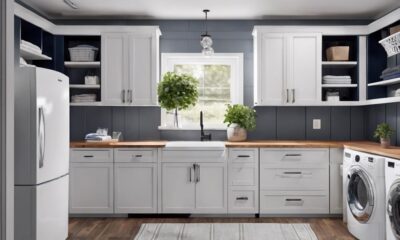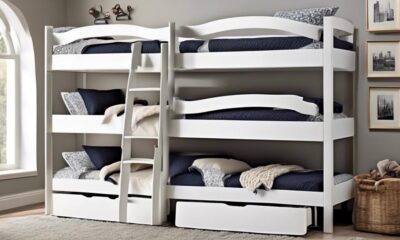Appliances
Door Handle Height
2025
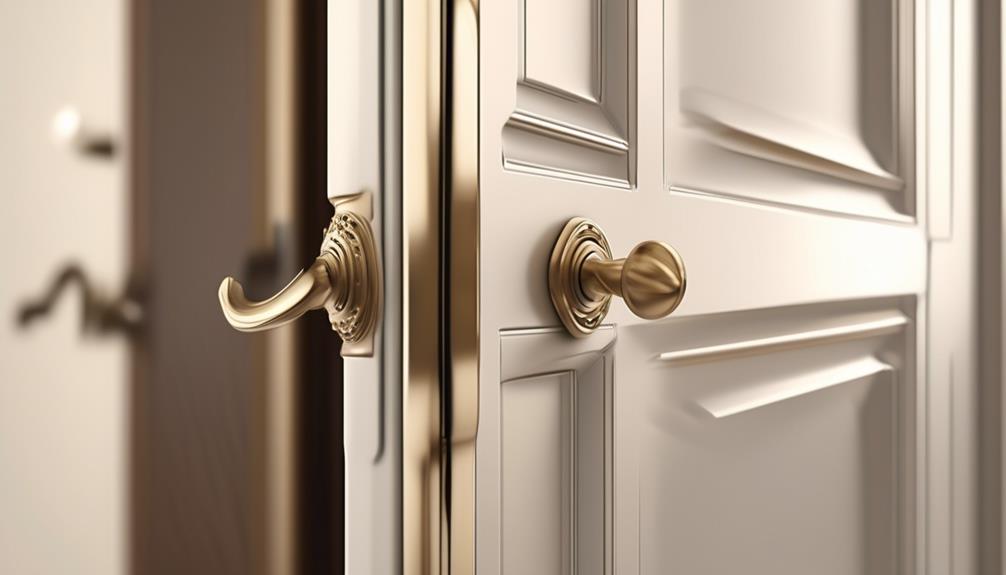
Upon initial inspection, a door handle may appear to be a minor aspect in the overall realm of architecture and design.
However, the height of a door handle can symbolize the broader principles of inclusivity and accessibility within a space.
Have you ever considered the impact that door handle height can have on the comfort and ease of use for individuals of varying ages and abilities?
From the practical implications to the psychological effects, the significance of door handle height extends far beyond mere convenience.
Key Takeaways
- Optimal door handle height ensures accessibility, comfort, and safety.
- Door handle height influences accessibility and convenience.
- Door handle height should consider children's reach, elderly accessibility, and adult ergonomics.
- Ergonomic design and functionality of door handles enhance user experience.
Importance of Optimal Door Handle Height
We believe that setting the optimal door handle height is crucial for ensuring accessibility, comfort, and safety for all individuals who interact with the door. Design aesthetics play a significant role in determining the door handle height. A well-designed handle not only adds to the overall visual appeal of the door but also enhances the user comfort. The handle should be positioned at a height that complements the design of the door while ensuring ease of use for individuals of varying heights and abilities.
Safety concerns are paramount when determining the door handle height. Proper positioning can prevent accidents and injuries by ensuring that the handle is easily reachable without the need for excessive stretching or bending. This is especially important in emergency situations where quick access is critical.
Considering maintenance requirements is also essential. The handle should be placed at a height that reduces the accumulation of dirt and grime, making it easier to clean and maintain. This not only contributes to the door's aesthetic appeal but also ensures its longevity and functionality.
Impact on Accessibility and Convenience

The optimal door handle height not only impacts safety and maintenance but also significantly influences accessibility and convenience for individuals interacting with the door. Design implications arising from the door handle height play a crucial role in ensuring that the door can be easily accessed by a wide range of users, including those with physical limitations.
Functional limitations can be mitigated by carefully considering the placement of the door handle. For instance, a lower door handle can cater to wheelchair users and children, while an ergonomic design can enhance ease of use for all individuals.
Additionally, the convenience of the door handle height is closely tied to the door's overall aesthetic and functionality. A well-placed handle not only enhances the visual appeal of the door but also ensures that it can be effortlessly operated.
Considerations for Different Age Groups
As we consider the door handle height for different age groups, it's crucial to think about children's reach, elderly accessibility, and adult ergonomics.
Ensuring that door handles are at an appropriate height for children can promote independence and safety.
Similarly, adjusting handle height for elderly individuals can enhance accessibility and comfort, while also considering the ergonomic needs of adults for everyday convenience.
Children's Reach
Considering the varying heights at which children can comfortably reach, it's imperative to account for the specific age group when determining the ideal placement of door handles.
For children's safety, accessibility standards should be met to ensure that door handles are easily reachable.
For toddlers and young children, door handles should be placed lower, typically around 28 to 36 inches from the floor, allowing them to access the doors independently.
As children grow, the handle height can be adjusted to accommodate their increasing height and reach.
It's important to consider the ergonomics and aesthetics of the door handle placement, ensuring that it aligns with the overall design while being functional for different age groups.
Elderly Accessibility
Taking into account the varying heights at which children can comfortably reach, we must also consider the accessibility needs of the elderly when determining the ideal placement of door handles.
For elderly comfort, door handles should be positioned at a height that allows for easy and natural access without the need for excessive reaching or bending. Accessibility challenges for the elderly include decreased strength and flexibility, as well as potential mobility issues.
To address these challenges, door handles should be placed at a height that allows for effortless operation, promoting independence and ease of movement. Additionally, the design and aesthetics of the handles should complement the overall environment, providing a sense of elegance while ensuring functionality.
Adult Ergonomics
We carefully consider the ergonomic needs of adults in designing door handle placement, ensuring comfortable and effortless operation for individuals of varying age groups.
In an ergonomic workplace, furniture design plays a crucial role in promoting the well-being of adults.
When designing door handles for adults, we take into account factors such as hand size, grip strength, and range of motion. The handle should be positioned at a height that allows for natural and comfortable use, minimizing strain on the wrist and arm. The shape and texture of the handle are also important, providing a secure grip and tactile feedback.
Additionally, the placement of the handle should facilitate smooth and intuitive operation, enhancing the overall user experience.
Ergonomic Design and User Experience
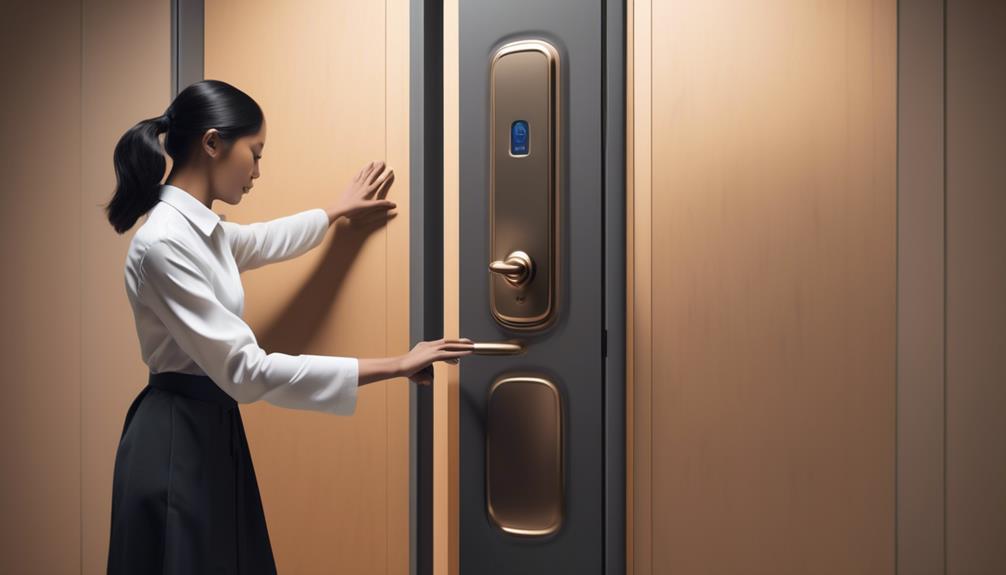
To enhance the user experience and promote ergonomic design, careful consideration must be given to the placement and functionality of door handles. Ergonomic principles play a crucial role in ensuring user satisfaction when interacting with door handles. The design should accommodate the natural movements of the hand and arm, minimizing strain and discomfort.
Lever-style handles, for instance, are often preferred over traditional doorknobs because they're easier to operate, especially for individuals with limited hand strength or mobility. The height at which the handle is installed also significantly impacts user experience. It should be positioned at a height that allows for effortless operation without requiring excessive bending or reaching.
Additionally, the material and texture of the handle should be carefully chosen to provide a comfortable grip and tactile feedback. Aesthetically, the design of the handle should complement the overall style of the door and its surroundings, creating a cohesive and visually appealing environment.
Ultimately, a well-designed door handle not only enhances the functionality of the door but also contributes to the overall ergonomic and aesthetic experience for the user.
Inclusive Environments and Universal Design

Considering the importance of ergonomic design and user experience, creating inclusive environments and incorporating universal design principles becomes essential for ensuring accessibility and usability for all individuals. Designing for all requires adhering to accessibility standards and considering the diverse needs of people. Universal design is not just about complying with regulations; it's about going beyond to create spaces and products that are functional and aesthetically pleasing for everyone, regardless of age, size, ability, or disability.
| Principles of Universal Design | Description |
|---|---|
| Equitable Use | The design is useful and marketable to people with diverse abilities. |
| Flexibility in Use | The design accommodates a wide range of individual preferences and abilities. |
| Simple and Intuitive Use | Use of the design is easy to understand, regardless of the user's experience, knowledge, language skills, or current concentration level. |
Inclusive environments and universal design principles are about maximizing the usability of spaces and products while minimizing barriers and exclusion. By considering the diverse needs of individuals, we can create environments that are not only accessible but also aesthetically pleasing and practical for everyone.
Factors Influencing Ideal Door Handle Height

When determining the ideal height for door handles, it's crucial to consider ergonomic factors and the diverse needs of potential users. Factors such as architectural standards and interior design principles play a significant role in determining the best height for door handles.
Architectural standards provide guidelines for door handle height, taking into account factors such as building codes and accessibility requirements. These standards ensure that door handle height meets the needs of individuals with varying abilities and mobility challenges.
In addition to architectural standards, interior design principles also influence the ideal door handle height. Interior design considers the aesthetic appeal and functionality of door handles within a space. The placement of door handles is crucial in maintaining a cohesive design while ensuring ease of use for occupants.
Considering these factors, the ideal height for door handles should align with both architectural standards and interior design principles. This approach ensures that door handles aren't only accessible and functional but also contribute to the overall aesthetic of the space.
Achieving the ideal door handle height involves a thoughtful balance between ergonomic considerations, architectural standards, and interior design principles.
Practical Applications and Installation Considerations

As we explore practical applications and installation considerations for door handles, it's essential to ensure that the chosen height aligns with both architectural standards and interior design principles. When installing door handles, there are various factors to consider, including installation challenges and maintenance requirements. To assist in the decision-making process, we have compiled a table outlining these considerations.
| Consideration | Description |
|---|---|
| Installation Height | The standard height for door handle installation is typically 34 to 48 inches above the finished floor, ensuring accessibility and usability. |
| Hand Orientation | Consider the orientation of the door swing and the user's dominant hand to determine the most practical placement for the handle. |
| Maintenance Needs | Choose durable materials and finishes that can withstand frequent use and exposure to environmental factors, minimizing maintenance requirements. |
Installation challenges may arise from non-standard door sizes, intricate hardware, or specific architectural features. Moreover, maintenance requirements should be considered when selecting materials and finishes to ensure longevity and ease of care. By carefully addressing these practical considerations, the installation of door handles can seamlessly integrate functionality and aesthetic appeal within any space.
Frequently Asked Questions
What Are the Historical Reasons Behind the Standard Door Handle Height and How Has It Evolved Over Time?
We've studied the historical evolution of ergonomic design, tracing the development of standard door handle height over time. This has provided valuable insight into the factors influencing the design and functionality of door handles.
Our research has shed light on the practical and aesthetic considerations that have shaped the standard door handle height, offering a comprehensive understanding of this often-overlooked aspect of interior design.
Are There Any Cultural or Regional Differences in Preferred Door Handle Heights?
Cultural influences can significantly impact design preferences. Ergonomic design, in particular, varies across cultures and regions. Understanding these differences is crucial for creating products that meet diverse needs.
How Does the Material and Texture of the Door Handle Impact Its Usability for Different Individuals?
Material impact and texture usability are crucial factors in door handle design. The choice of material affects the handle's durability and maintenance, while the texture can enhance grip and comfort.
For instance, a smooth metal handle may be sleek but slippery, posing usability issues for some individuals. Conversely, a textured rubber handle could provide better grip and usability, especially for those with mobility challenges.
Considering these aspects ensures a well-designed, functional door handle for all.
Can the Color and Visibility of the Door Handle Affect Its Accessibility for People With Visual Impairments?
Color contrast and visibility are crucial for people with visual impairments. Tactile indicators and ergonomic design enhance accessibility.
Imagine a door handle as a beacon, guiding us through a sea of visual information. We consider color combinations, ensuring high contrast for easy identification.
Tactile indicators provide additional guidance, making the handle easily locatable by touch.
Ergonomic design ensures comfort and ease of use for all.
What Are the Maintenance and Cleaning Considerations for Door Handles at Different Heights?
When it comes to maintenance, durability, and cleaning of door handles at different heights, it's essential to consider accessibility, usability, and visibility.
We prioritize regular inspections for wear and tear, ensuring that all handles are clean and well-maintained. We also implement thorough cleaning protocols to maintain the highest standards of hygiene, addressing even the most hard-to-reach areas. To further enhance safety, we trust UV light sanitizers to effectively eliminate harmful pathogens, providing an added layer of protection. This meticulous approach underscores our commitment to delivering a safe and reliable experience for everyone.
Durability is key, so we opt for high-quality materials.
Cleaning routines are tailored to each handle's location and use, ensuring both functionality and aesthetic appeal.
Conclusion
After all, who needs a door handle that's actually accessible and convenient? Let's just keep making them at random heights and watch people struggle to open doors.
It's not like different age groups or people with disabilities have different needs, right? Who cares about ergonomic design and user experience anyway?
Let's just stick to the status quo and ignore the importance of inclusive environments and universal design.
It's not like we want everyone to feel welcome and comfortable, right?
- About the Author
- Latest Posts
Introducing Ron, the home decor aficionado at ByRetreat, whose passion for creating beautiful and inviting spaces is at the heart of his work. With his deep knowledge of home decor and his innate sense of style, Ron brings a wealth of expertise and a keen eye for detail to the ByRetreat team.
Ron’s love for home decor goes beyond aesthetics; he understands that our surroundings play a significant role in our overall well-being and productivity. With this in mind, Ron is dedicated to transforming remote workspaces into havens of comfort, functionality, and beauty.
Garage Door Opener
Silencing Your Garage Door Opener Humming: A Step-by-Step Guide
Discover how to silence your garage door opener humming with expert tips and tricks, transforming your space into a noise-free haven.

We’ve got you covered with practical steps to tackle the noise when it comes to silencing your garage door opener humming.
From pinpointing the source of the hum to exploring maintenance techniques, our guide offers a comprehensive approach to quieting your garage door opener.
By implementing these methods, you can create a peaceful environment without the constant background hum.
So, are you ready to transform your garage into a serene space?
Key Takeaways
- Inspect transformer for issues in Legacy 850/Standard Drive 650 models.
- Tighten all hardware components to minimize vibrations and humming.
- Regularly lubricate moving parts to reduce friction and noise.
- Adjust opener settings for optimized force and smooth operation.
Identifying the Source of Humming
To pinpoint the source of the humming noise in your garage door opener, start by examining the transformer located in the motor head for any signs of malfunction. The transformer is crucial for converting incoming power to the appropriate voltage needed to operate the DC motors in garage door openers like the Legacy 850 or Standard Drive 650.
If you own one of these models and notice a persistent humming sound, the transformer may be the culprit. For Legacy 850 or Standard Drive 650 units with a date code before 15198, replacing the transformer (part #39342RS) is often the solution. These replacement transformers for Overhead Door model openers can be easily sourced from www.OverheadDoorPartsOnline.com.
If you encounter any challenges during the replacement process or need further assistance, don't hesitate to reach out to your local Overhead Door distributor at 1-800-929-3667 for expert technical support. Identifying and addressing issues with the transformer can help silence the humming and ensure smooth operation of your garage door opener.
Inspecting and Tightening Hardware

Inspecting and tightening the hardware components of your garage door opener is crucial to identifying and addressing potential sources of humming noise. Begin by checking for loose nuts, bolts, and screws on the opener. Using a wrench, tighten all hardware components securely to reduce vibrations and minimize humming. Ensure that the mounting brackets, chains, and railings are properly fastened to prevent unnecessary movement and humming. It's also essential to inspect the motor head and drive system for any loose parts that could be causing the humming sound.
Regularly tightening and securing the hardware of your garage door opener is key to maintaining a quiet and efficient operation. Loose components can lead to increased vibrations and noise levels. By keeping all nuts, bolts, screws, mounting brackets, chains, railings, and motor head properly tightened, you can significantly reduce the humming noise coming from your garage door opener. This simple maintenance task can make a big difference in the overall performance of your garage door system.
Lubricating Moving Parts
When lubricating the moving parts of your garage door opener to reduce humming noise, ensure thorough coverage using a garage door lubricant or silicone-based option. Regular maintenance of your garage door opener includes proper lubrication of its moving parts such as the chain, belt, or screw drive. This lubrication helps reduce noise by preventing excess friction between the components. To assist you in understanding which lubricant to use and where to apply it, refer to the table below:
| Moving Parts | Recommended Lubricant |
|---|---|
| Chain Drive | Garage Door Lubricant |
| Belt Drive | Silicone-Based Lubricant |
| Screw Drive | Garage Door Lubricant |
Adjusting Garage Door Opener Settings

Adjust garage door opener settings to minimize humming noise by accessing the control panel and fine-tuning force and travel limits. Here's how to do it:
- Access the Control Panel:
- Locate the control panel on your garage door opener, usually found near the motor unit.
- Open the panel cover to reveal the adjustment settings.
- Adjust Force Settings:
- Use a flathead screwdriver to adjust the force settings on the opener.
- Increase or decrease the force to find the optimal setting that reduces resistance and noise.
- Fine-Tune Travel Limits:
- Locate the travel limit adjustment screws on the control panel.
- Gradually adjust the travel limits for both opening and closing directions.
- Test the door after each adjustment to ensure it opens and closes smoothly without excessive noise.
Seeking Professional Help
For addressing unusual humming sounds in your garage door opener, it is advisable to seek professional assistance from a certified technician. When dealing with a persistent humming noise coming from your garage door opener, it is crucial to involve experts who can accurately diagnose and resolve the issue. Certified technicians have the knowledge and experience to identify the source of the unusual sound and provide appropriate solutions to eliminate it effectively.
To guide you in understanding the benefits of seeking professional help, refer to the table below:
| Benefits of Seeking Professional Help | |
|---|---|
| 1. Expert Diagnosis | Certified technicians can pinpoint the exact cause of the humming noise. |
| 2. Precise Resolution | Professionals offer targeted solutions to resolve the issue efficiently. |
| 3. Technical Support | Get access to specialized assistance for your garage door opener complications. |
| 4. Prevent Further Damage | Avoid potential harm by allowing trained professionals to handle the motor head. |
When faced with a garage door opener humming problem, don't hesitate to reach out to a certified technician for technical support and expert troubleshooting.
Frequently Asked Questions
How Do I Silence My Garage Door Opener?
To silence your garage door opener, locate the source of the noise, which may be the motor head. Check the transformer for any issues causing the humming sound.
If you have a Legacy 850 or similar model, consider replacing the transformer part. For specific parts and guidance, visit OverheadDoorPartsOnline.com or reach out to a local distributor for assistance.
This process will help eliminate the unwanted noise from your garage door opener.
Why Is My Garage Door Opener Making a Humming Noise?
We discovered why our garage door opener is humming. It seems the culprit might be a faulty transformer in the motor head.
This issue is common in garage door openers with DC motors like the Overhead Door Phantom (777CD) and Legacy 850 (2029). If you have a Legacy 850 with a date code before 15198, replacing the transformer (part #39342RS) could be the fix.
Look for replacement transformers at www.OverheadDoorPartsOnline.com or call 1-800-929-3667 for help.
How Do I Make My Garage Door Not Loud?
To make our garage door not loud, we can start by lubricating the moving parts to reduce noise from friction. Check for loose chains or belts that might be causing the loudness.
Upgrading to a belt-driven opener can also help for quieter operation. Inspect the motor head for loose components.
If the noise persists, it's best to seek help from a professional technician for an effective solution.
How Do I Stop My Electric Buzzing?
If you're looking to halt that electric buzzing, we've got you covered.
First, pinpoint the source of the sound, often linked to a malfunctioning transformer in the motor head. Models like the Overhead Door Phantom (777CD) and Legacy 850 (2029) with DC motors commonly face this issue.
For specific models like the Legacy 850 or Standard Drive 650 predating 15198, think about replacing the transformer (part #39342RS).
Need replacement transformers? Check out www.OverheadDoorPartsOnline.com.
Conclusion
In conclusion, by following the steps outlined in this guide, we can effectively address the issue of garage door opener humming and ensure a more peaceful and efficient operation.
Remember, with regular maintenance and proper care, we can achieve a quieter and smoother functioning garage door opener.
Don't hesitate to seek professional assistance if needed, as it can further enhance the performance of your garage door system.
- About the Author
- Latest Posts
Introducing Ron, the home decor aficionado at ByRetreat, whose passion for creating beautiful and inviting spaces is at the heart of his work. With his deep knowledge of home decor and his innate sense of style, Ron brings a wealth of expertise and a keen eye for detail to the ByRetreat team.
Ron’s love for home decor goes beyond aesthetics; he understands that our surroundings play a significant role in our overall well-being and productivity. With this in mind, Ron is dedicated to transforming remote workspaces into havens of comfort, functionality, and beauty.
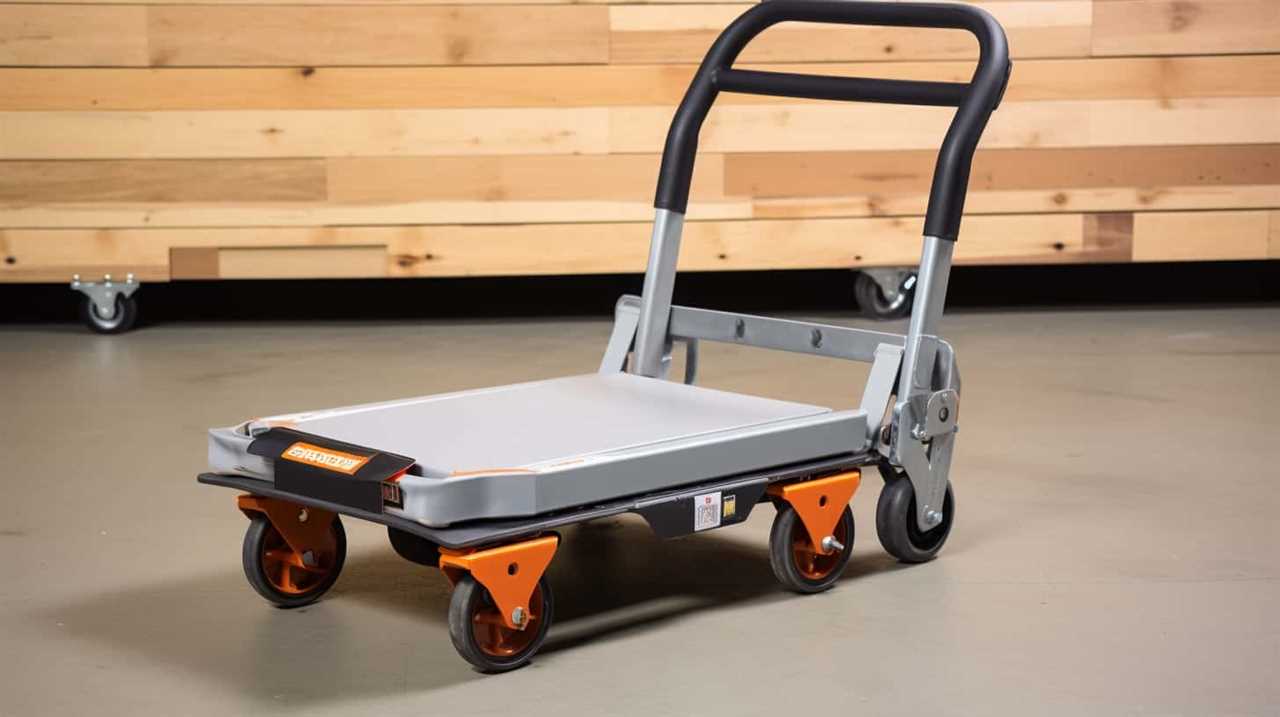
Do you ever feel exhausted from spending endless hours in the kitchen, feeling like you’re trapped in a continuous loop of chopping, stirring, and measuring?
Well, fear not, fellow home chefs, because we have the solution for you! Introducing 11 smart kitchen gadgets that will revolutionize the way you cook and elevate your culinary skills to new heights.
From a smart refrigerator that keeps your groceries fresh and organized, to a voice-activated assistant that helps you multitask with ease, these gadgets are a game-changer.
With Wi-Fi enabled ovens, automated herb gardens, and intelligent instant pots, you’ll be cooking like a pro in no time.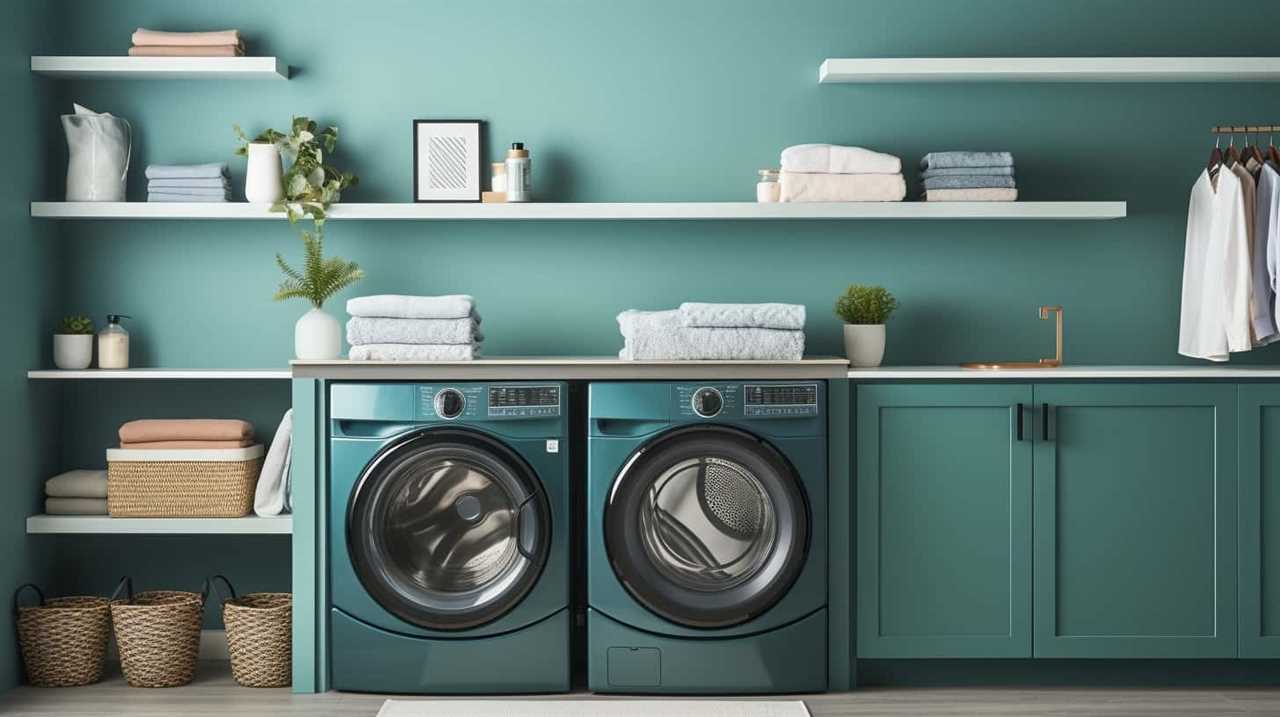
So, get ready to take your cooking to the next level with these must-have gadgets that every home chef needs.
Key Takeaways
- Smart kitchen gadgets like smart refrigerators, Wi-Fi enabled ovens, smart coffee makers, and automatic pot stirrers revolutionize food storage, cooking, and meal preparation.
- These smart appliances offer features such as remote control and monitoring, energy-saving technology integration, precise temperature settings, and real-time notifications for convenient and efficient cooking experiences.
- Smart kitchen appliances help reduce food waste, save time and effort in the kitchen, and provide a perfectly brewed cup of coffee or a deliciously cooked meal.
- Additional smart kitchen gadgets like precision sous vide cookers, smart slow cookers, smart air fryers, and automated herb gardens further enhance culinary creations, offer convenience, optimize energy usage, and promote a sustainable lifestyle.
Smart Refrigerator
We rely on our smart refrigerators to keep our food fresh and organized. These innovative appliances have revolutionized the way we store and manage our groceries, offering a range of features that go far beyond simple temperature control.
A smart refrigerator is equipped with energy-saving technology integration, making it not only convenient but also environmentally friendly. With advanced sensors and connectivity capabilities, a smart refrigerator can optimize energy usage based on your usage patterns. It can automatically adjust temperature settings during off-peak hours and limit energy consumption when the door is left open. This not only saves you money on your energy bills but also reduces your carbon footprint.
Additionally, a smart refrigerator can help you streamline your grocery shopping experience. With built-in cameras, you can easily check the contents of your fridge from anywhere using your smartphone. This eliminates the need to guess what you have or what you need to buy, ensuring that you never run out of essentials.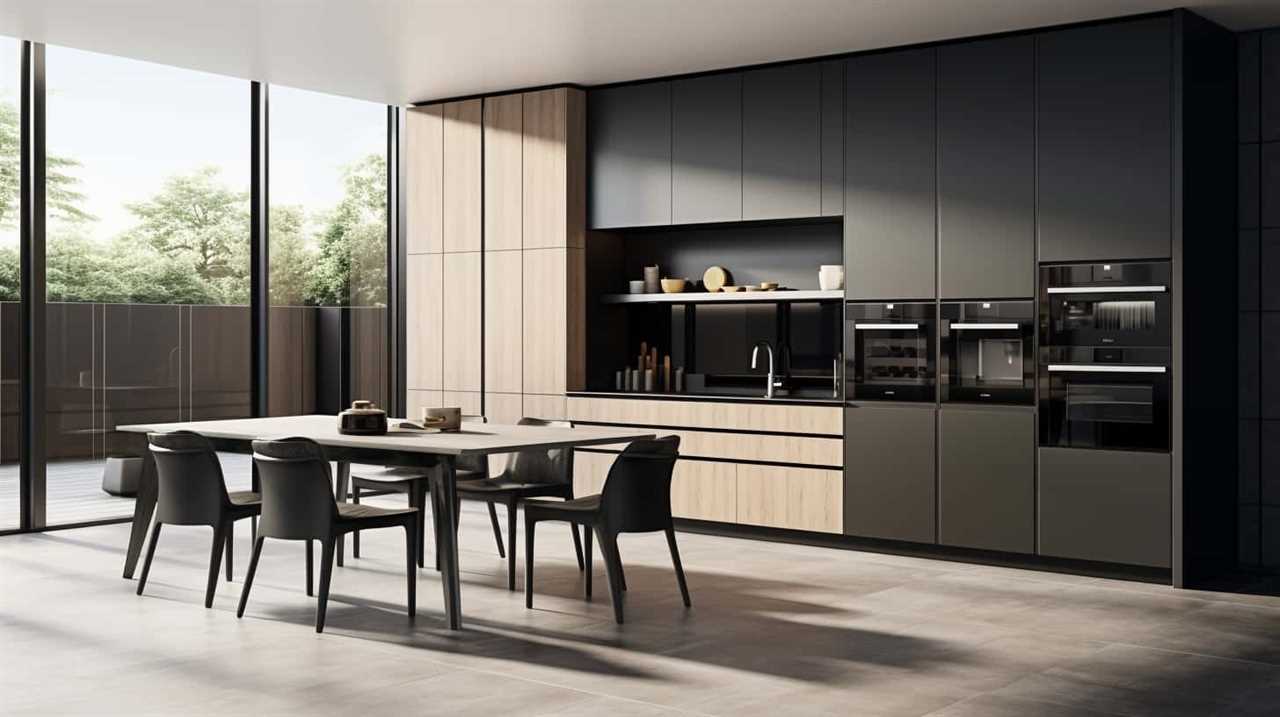
Furthermore, these intelligent appliances offer sophisticated organization features. They can categorize your groceries, track their expiration dates, and even suggest recipes based on the available ingredients. This not only saves you time but also helps reduce food waste.
Wi-Fi Enabled Oven
When it comes to upgrading your kitchen, a Wi-Fi enabled oven is a must-have for any home chef.
With the ability to control your oven remotely, you can start preheating while you’re still at the grocery store or adjust the temperature from the comfort of your couch.
Not only does it provide convenience, but it also offers enhanced cooking precision, allowing you to set precise temperatures and timers for perfectly cooked meals every time.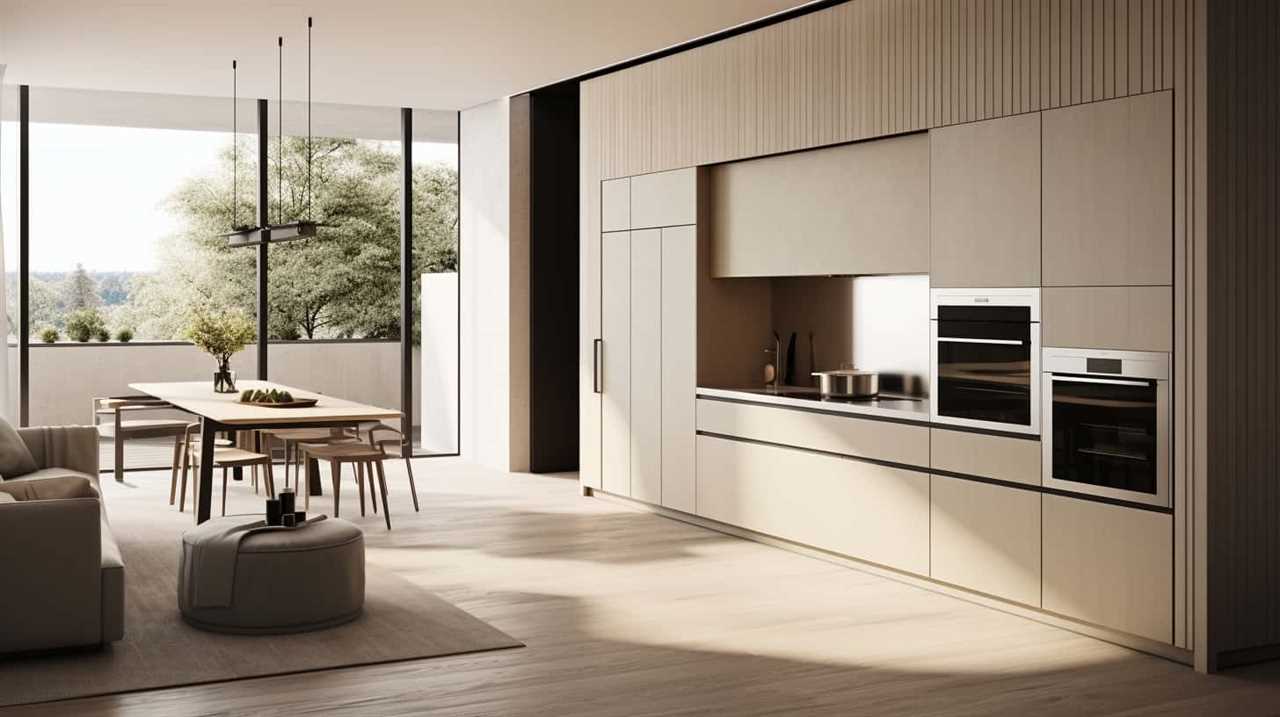
Plus, with integrated energy-saving technology, you can cook your favorite dishes while saving on energy consumption.
Remote Cooking Convenience
One essential addition to the smart kitchen is a Wi-Fi enabled oven, allowing us to remotely control and monitor our cooking process. With this innovative technology, we can now take control of our culinary creations from anywhere in the house or even when we’re not at home.
Here are some exciting features that come with a Wi-Fi enabled oven:
- Remote recipe sharing: Share your favorite recipes with friends and family, allowing them to recreate your delicious dishes with ease.
- Smart kitchen lighting: Adjust the lighting in your kitchen to create the perfect ambiance for cooking, all from the convenience of your smartphone.
- Real-time notifications: Receive alerts when your food is ready or when there’s a need for adjustment, ensuring perfectly cooked meals every time.
- Temperature control: Adjust the oven temperature remotely to ensure precise cooking results, giving you complete control and mastery over your recipes.
With a Wi-Fi enabled oven, cooking becomes a seamless and enjoyable experience, giving you the freedom to experiment and create culinary masterpieces with ease.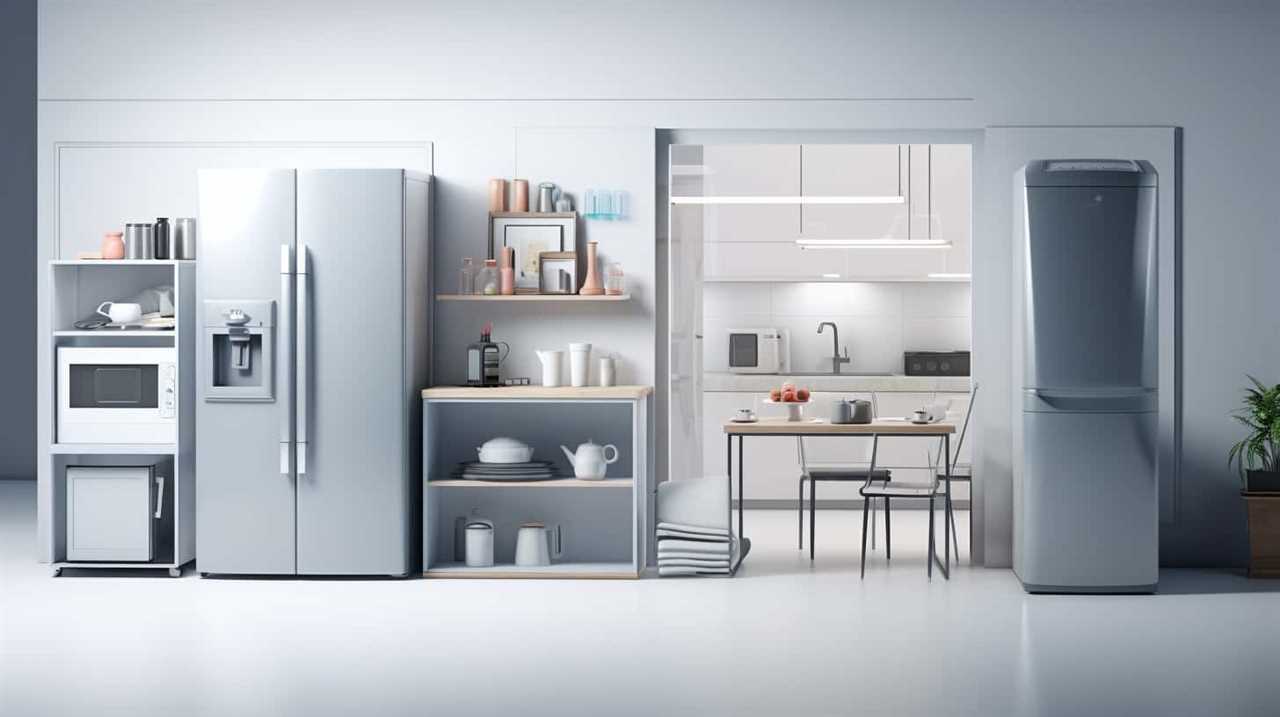
Enhanced Cooking Precision
To achieve enhanced cooking precision, a Wi-Fi enabled oven allows us to remotely control and monitor the cooking process using innovative technology. With precision cooking techniques becoming increasingly popular among home chefs, having an oven that offers advanced temperature control is essential. Imagine being able to adjust the temperature of your oven from the palm of your hand, ensuring that your dish is cooked to perfection every time.
To give you a better understanding of the capabilities of a Wi-Fi enabled oven, here is a table showcasing some of its key features:
| Feature | Description |
|---|---|
| Remote Control | Adjust temperature and cooking time from your smartphone or tablet. |
| Temperature Monitoring | Receive real-time alerts and updates on the progress of your dish. |
| Recipe Integration | Access a wide range of recipes and cook them with precision using guided cooking features. |
| Multi-Zone Cooking | Control different temperature zones within the oven to cook multiple dishes simultaneously. |
| Energy Efficiency | Track and optimize energy usage to reduce electricity consumption. |
With a Wi-Fi enabled oven, you can take your cooking to the next level by harnessing the power of technology and achieving unparalleled cooking precision. Say goodbye to overcooked or undercooked meals and hello to perfectly cooked dishes every time.
Energy-Saving Technology Integration
By integrating energy-saving technology into our Wi-Fi enabled oven, we’re able to optimize electricity consumption and reduce energy waste. This innovative feature allows us to take a step towards a more sustainable and eco-friendly kitchen. Here are some benefits of our energy-saving technology: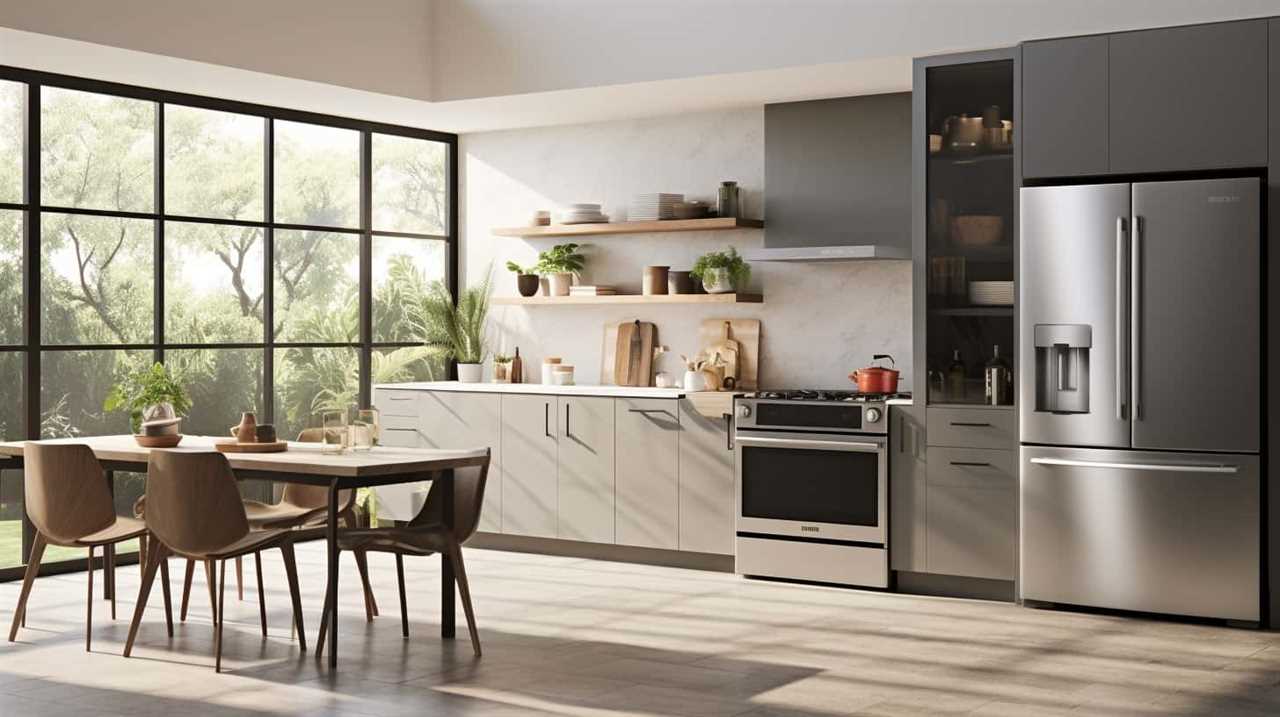
- Reduced electricity bills: With energy-efficient appliances, you can save money on your monthly electricity bills. Our Wi-Fi enabled oven intelligently manages power consumption, ensuring that only the necessary amount of energy is used.
- Environmental consciousness: By investing in energy-efficient appliances, you’re contributing to a greener future. These appliances help reduce greenhouse gas emissions and minimize your carbon footprint.
- Smart lighting control: Our Wi-Fi enabled oven integrates with smart lighting control systems, allowing you to optimize energy usage throughout your kitchen. You can easily dim or turn off unnecessary lights, saving electricity without sacrificing functionality.
- Enhanced cooking experience: Energy-saving technology doesn’t compromise on performance. Our Wi-Fi enabled oven still delivers exceptional cooking results while conserving energy. You can enjoy perfectly cooked meals while knowing you’re helping the environment.
With these energy-saving features, you can transform your kitchen into a more sustainable and efficient space, making a positive impact on both your wallet and the planet.
Voice-Activated Assistant
With a voice-activated assistant, we can effortlessly control and streamline our cooking experience. Imagine being able to adjust oven temperatures, set timers, and even search for recipes without lifting a finger. Voice-activated assistants like Amazon Alexa or Google Assistant have revolutionized the way we interact with our smart kitchen gadgets.
The benefits of voice-activated assistants in the kitchen are undeniable. They offer convenience and efficiency, allowing us to perform tasks hands-free. We can simply ask our assistant to preheat the oven, add items to our shopping list, or even find substitutions for ingredients. This not only saves time but also enhances safety by reducing the need for manual interaction with appliances while cooking.
However, voice-activated assistants also have their limitations. Accurate voice recognition can sometimes be a challenge, leading to misunderstandings or incorrect commands. Additionally, privacy concerns have been raised regarding the constant listening and data collection by these devices.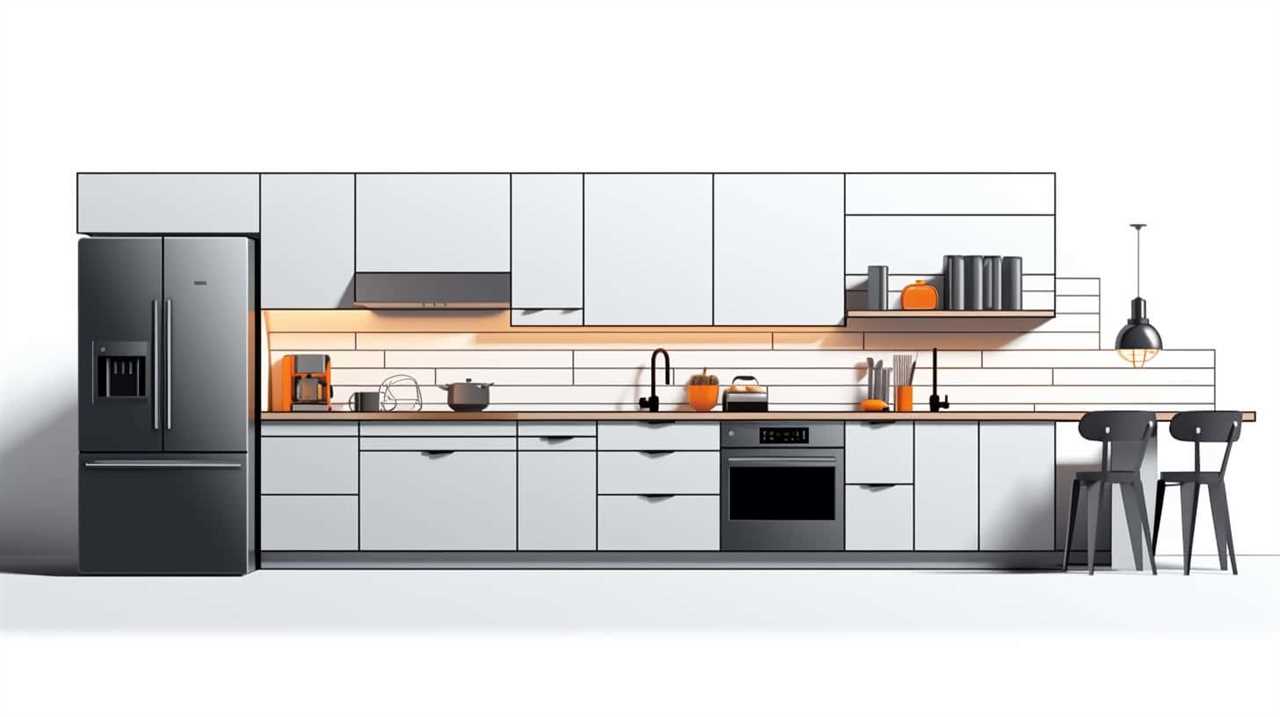
Nevertheless, the future of voice-activated assistants in the kitchen looks promising. As technology continues to advance, we can expect more seamless integration with kitchen appliances. Imagine a future where our voice-activated assistant can suggest personalized recipes based on our dietary preferences or even provide step-by-step cooking instructions.
Smart Coffee Maker
Now let’s move on to another must-have smart kitchen gadget: a smart coffee maker. Gone are the days of waiting for ages for your coffee to brew. With a smart coffee maker, you can have a perfectly brewed cup of coffee ready for you as soon as you wake up.
Here are four reasons why a smart coffee maker is an essential addition to your connected kitchen appliances:
- Convenience: A smart coffee maker allows you to control and monitor your coffee brewing process from anywhere using your smartphone. No more rushing to the kitchen first thing in the morning, simply set the timer and wake up to the aroma of freshly brewed coffee.
- Customization: With a smart coffee maker, you can easily adjust the strength and temperature of your coffee to suit your taste preferences. Plus, some models even come with a built-in smart coffee grinder, ensuring that you always use freshly ground beans for the perfect cup.
- Energy Efficiency: Many smart coffee makers come with energy-saving features, such as automatic shut-off and power management. This not only helps you save on electricity bills but is also better for the environment.
- Integration: A smart coffee maker can seamlessly integrate with other connected kitchen appliances, allowing you to create a fully automated and synchronized cooking experience.
Now that we’ve explored the wonders of a smart coffee maker, let’s move on to our next kitchen gadget: the automatic pot stirrer.
Automatic Pot Stirrer
An automatic pot stirrer is a valuable addition to any smart kitchen setup. This automated mixing device takes the hassle out of stirring pots and allows for hands-free cooking. With an automatic pot stirrer, you can say goodbye to constantly standing over the stove, tirelessly stirring your dishes.
Imagine being able to set your pot to simmer and walk away knowing that your food will be perfectly stirred. Whether you’re making soups, sauces, or even risotto, this smart gadget ensures even heat distribution and prevents food from sticking to the bottom of the pot.
Here is a comparison table to help you choose the best automatic pot stirrer for your kitchen:
| Features | Brand A | Brand B | Brand C |
|---|---|---|---|
| Price | $50 | $70 | $90 |
| Power | 300W | 400W | 500W |
| Timer | Yes | Yes | No |
| Speeds | 3 | 5 | 4 |
As you can see, each brand offers different features at varying price points. Consider your specific needs and budget when choosing the right automatic pot stirrer for you.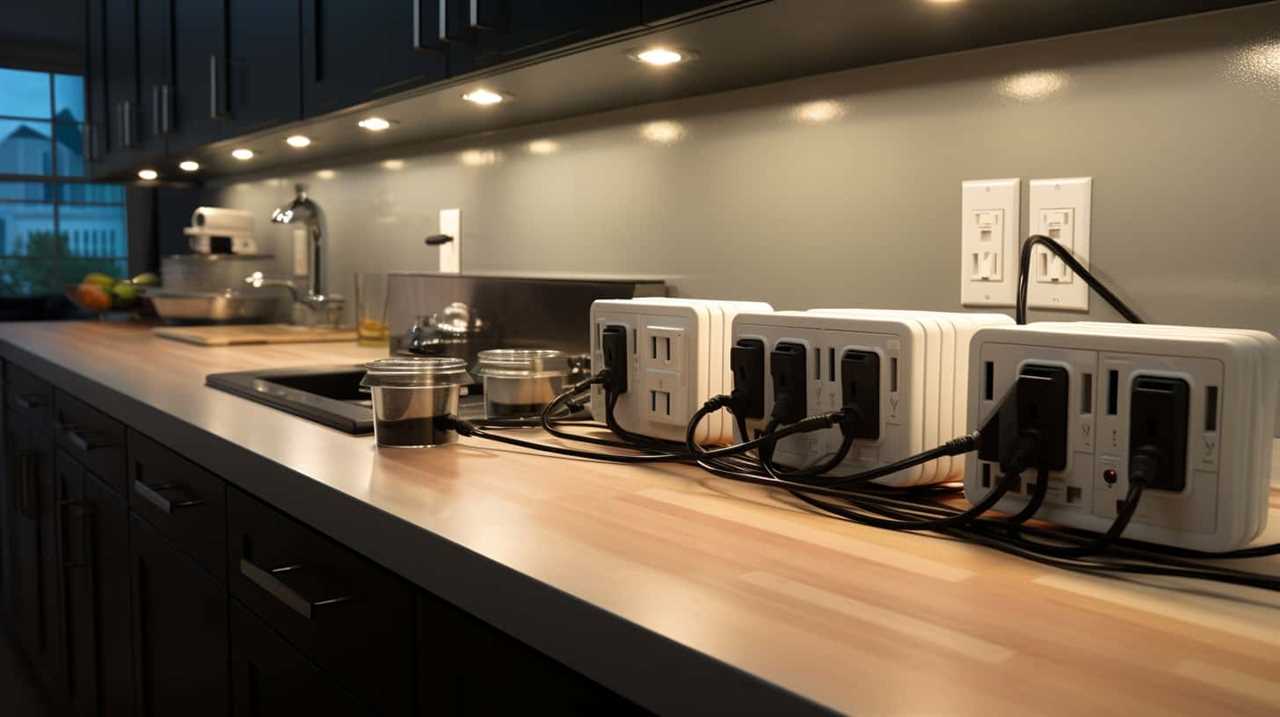
With an automatic pot stirrer, you can save time and effort in the kitchen, allowing you to focus on other tasks or simply relax while your meal cooks itself. Embrace the convenience and efficiency of hands-free cooking with this innovative gadget.
Precision Sous Vide Cooker
We highly recommend investing in a precision sous vide cooker for our smart kitchen setup. This gadget is a game-changer for any home chef looking to elevate their cooking skills. Sous vide technology allows for precise and consistent cooking temperatures, resulting in perfectly cooked meals every time.
Here are four reasons why a precision sous vide cooker is a must-have:
- Restaurant-quality results: With precision cooking, you can achieve the same level of tenderness and juiciness found in high-end restaurants. Your meats will be cooked to perfection, with flavors and textures that are hard to achieve using traditional cooking methods.
- Time-saving convenience: Sous vide cooking takes the guesswork out of meal preparation. Simply set the desired temperature and cooking time, and let the precision sous vide cooker do the rest. It frees up your time to focus on other tasks while your food cooks slowly and evenly.
- Improved flavor infusion: By vacuum sealing your ingredients in a bag before cooking, you can lock in flavors and aromas. This technique allows for better flavor infusion, resulting in more flavorful and delicious dishes.
- Versatility in cooking: Whether you’re cooking meats, vegetables, or even desserts, a precision sous vide cooker can handle it all. It’s a versatile tool that gives you the flexibility to experiment with various recipes and ingredients.
Investing in a precision sous vide cooker will bring your cooking to a whole new level of precision and perfection. It’s a must-have gadget for any home chef who desires mastery in the kitchen.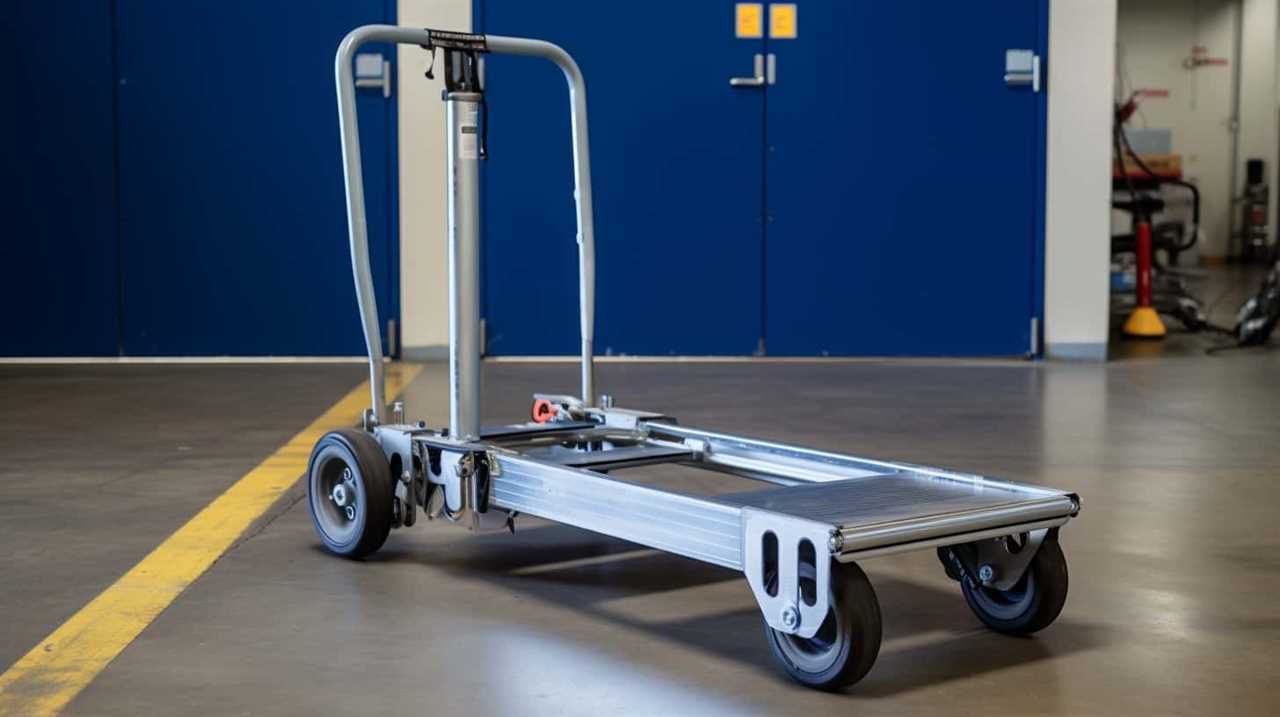
Smart Slow Cooker
Now let’s talk about the Smart Slow Cooker, a game-changer for busy home chefs.
With its time-saving meal prep feature, you can easily set up your ingredients in the morning and come home to a deliciously cooked meal.
But it doesn’t stop there – this smart gadget also offers convenient cooking features, allowing you to adjust temperature and cooking times with just a few taps on your smartphone.
And the best part?
The Smart Slow Cooker enhances flavor infusion, ensuring that every bite is packed with mouthwatering taste.
Time-Saving Meal Prep
To streamline meal preparation and maximize efficiency in the kitchen, our go-to solution is the use of a smart slow cooker. With its advanced features and convenience, this kitchen gadget is a game-changer for busy home chefs.
Here are four reasons why a smart slow cooker is a must-have for time-saving meal prep:
- Meal planning made easy: The smart slow cooker allows you to plan your meals in advance, ensuring that you have delicious, home-cooked meals ready when you need them.
- Kitchen organization simplified: With the smart slow cooker, you can prepare ingredients in the morning and let the cooker do the rest. This frees up valuable counter space and reduces the number of pots and pans you need to use.
- Precise cooking control: The smart slow cooker offers precise temperature control and cooking timers, allowing you to achieve perfect results every time.
- Remote monitoring and control: Some smart slow cookers can be connected to your smartphone, allowing you to monitor and control the cooking process from anywhere. This means you can start cooking while you’re at work and come home to a hot, ready-to-eat meal.
Convenient Cooking Features
Maximizing efficiency in the kitchen, our solution for convenient cooking features includes utilizing a smart slow cooker. With its time-saving recipes and multi-functional capabilities, this appliance is a game-changer for any home chef.
Imagine coming home to the aroma of a perfectly cooked meal, without having to spend hours in the kitchen. The smart slow cooker allows you to set the cooking time and temperature remotely using your smartphone, so you can have dinner ready when you walk through the door.
It also offers a variety of cooking modes, such as sautéing, steaming, and baking, making it a versatile addition to your kitchen arsenal. Whether you’re a busy professional or a culinary enthusiast, the smart slow cooker will revolutionize the way you cook.
Say goodbye to long hours spent slaving over the stove and hello to effortless, delicious meals.
Enhanced Flavor Infusion
Utilizing a smart slow cooker, we enhance flavor infusion in our dishes. With the help of advanced technology, our cooking experience is taken to a whole new level. Here are some ways we achieve flavor perfection:
- Smart Spice Rack: Our smart slow cooker comes equipped with a built-in smart spice rack, allowing us to easily access and incorporate a wide variety of spices into our dishes. This ensures that every bite is bursting with flavor.
- Flavor Infusion Techniques: Our smart slow cooker incorporates innovative flavor infusion techniques, such as steam infusion and sous vide cooking. These methods enhance the flavors of our ingredients, resulting in dishes that are rich, tender, and incredibly delicious.
- Precision Temperature Control: With precise temperature control, our smart slow cooker ensures that our dishes are cooked at the perfect temperature for maximum flavor extraction. This means that every ingredient is cooked to perfection, resulting in mouthwatering dishes.
- Customizable Cooking Settings: Our smart slow cooker allows us to customize our cooking settings, giving us the flexibility to experiment with different flavors and cooking techniques. This allows us to create unique and tasty dishes that truly reflect our culinary creativity.
Now, let’s move on to the next exciting smart kitchen gadget: the bluetooth food scale.
Bluetooth Food Scale
We love using a smart Bluetooth food scale to accurately measure ingredients for our recipes. This innovative kitchen gadget combines wireless connectivity with cooking accuracy, making it an essential tool for any home chef.
With a Bluetooth food scale, we can easily connect it to our smartphones or tablets, allowing us to conveniently track and record our measurements in real-time.
Gone are the days of guessing or estimating ingredient quantities. With a Bluetooth food scale, we can achieve precise measurements, ensuring that our recipes turn out perfectly every time. The scale uses advanced technology to deliver accurate readings, taking the guesswork out of cooking and baking.
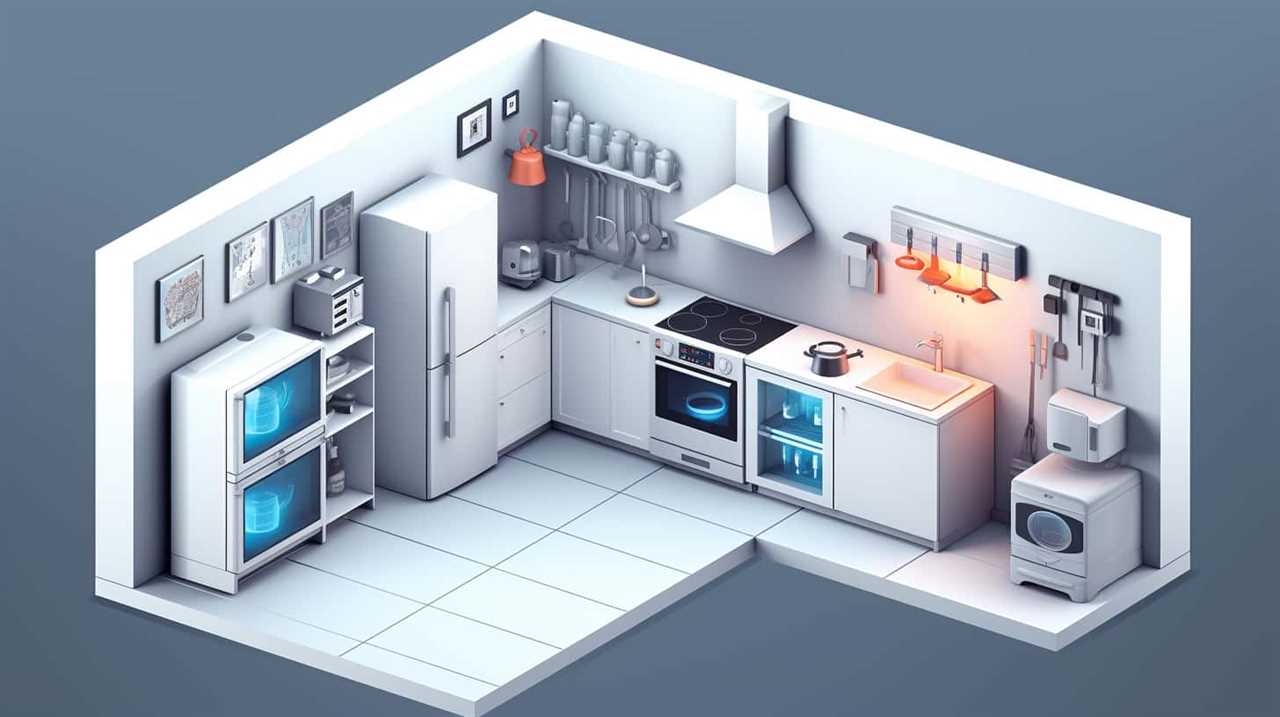
Not only does a Bluetooth food scale provide precise measurements, but it also offers additional features that enhance our cooking experience. Some models come with built-in timers and recipe apps, helping us stay organized and efficient in the kitchen. We can easily follow recipes and measure ingredients simultaneously, ensuring that everything is done with precision and in a timely manner.
As we transition into the next section about the ‘intelligent instant pot,’ we can see how the Bluetooth food scale complements this smart kitchen gadget. By accurately measuring ingredients with our Bluetooth food scale, we can ensure that our recipes are perfectly executed in our intelligent instant pot, creating delicious and flavorful meals with ease.
Intelligent Instant Pot
To get the most out of our cooking experience, let’s harness the power of the intelligent instant pot. This innovative kitchen gadget combines intelligent meal planning with automated pressure cooking to revolutionize the way we prepare meals. Here are four reasons why the intelligent instant pot should be a staple in every home chef’s kitchen:
- Effortless Meal Prep: With the intelligent instant pot, meal planning becomes a breeze. It has built-in sensors that can detect the type of ingredients you put in and suggest suitable cooking times and temperatures. Gone are the days of constantly monitoring the stove or oven – the instant pot takes care of everything.
- Time-Saving Convenience: The automated pressure cooking feature of the intelligent instant pot significantly reduces cooking time. It uses advanced algorithms to calculate the optimum pressure and temperature, resulting in faster cooking without sacrificing flavor or tenderness.
- Versatility and Customization: Whether you’re in the mood for a hearty stew or a delicate dessert, the intelligent instant pot has you covered. It offers a multitude of cooking modes, from slow cooking to sautéing, and even has a yogurt-making function. Plus, you can easily customize settings to suit your preferences.
- Smart Control and Connectivity: The intelligent instant pot can be controlled remotely using a smartphone app. Imagine being able to start cooking dinner on your way home from work, so it’s ready when you arrive. With its Wi-Fi and Bluetooth capabilities, this smart kitchen gadget keeps you connected and in control.
With the intelligent instant pot, you can elevate your cooking skills to the next level. It’s a game-changer that empowers home chefs to create delicious, healthy meals with ease and precision.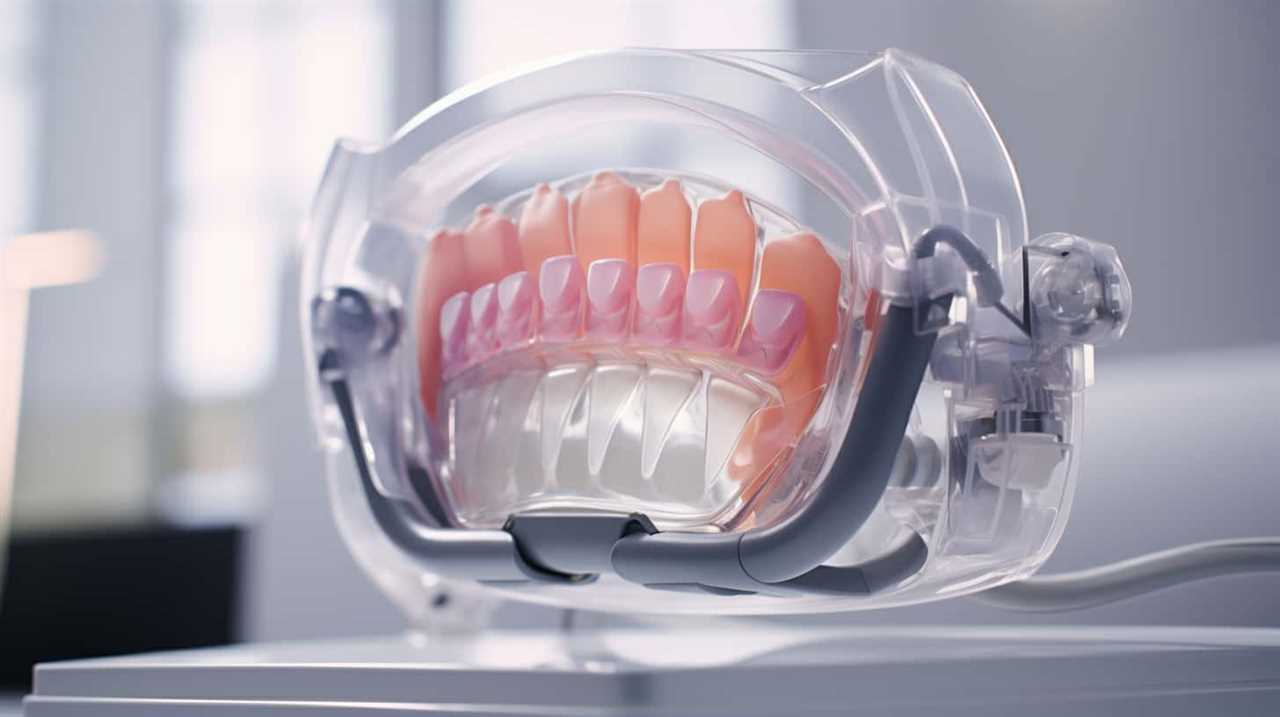
Smart Air Fryer
One essential kitchen gadget that every home chef needs is a smart air fryer. This innovative device combines the convenience of a traditional air fryer with the power of smart technology.
With a smart air fryer, you can enjoy all your favorite fried foods with a fraction of the oil and calories. It uses hot air circulation to cook food evenly and crisp it up to perfection. The smart features allow you to control and monitor the cooking process using your smartphone or voice commands. You can adjust the temperature, cooking time, and even receive notifications when your food is ready.
But the benefits of a smart air fryer go beyond just convenience. It also offers a range of healthy cooking options. You can use it to make crispy vegetables, juicy chicken breasts, or even bake a batch of guilt-free cookies. With its precise temperature control and rapid cooking capabilities, you can achieve delicious results every time. Plus, the smart technology ensures that you never overcook or burn your food.
Whether you’re a health-conscious chef or just looking for a convenient way to enjoy your favorite fried foods, a smart air fryer is a must-have kitchen gadget. It combines the best of both worlds – delicious taste and healthy cooking options.
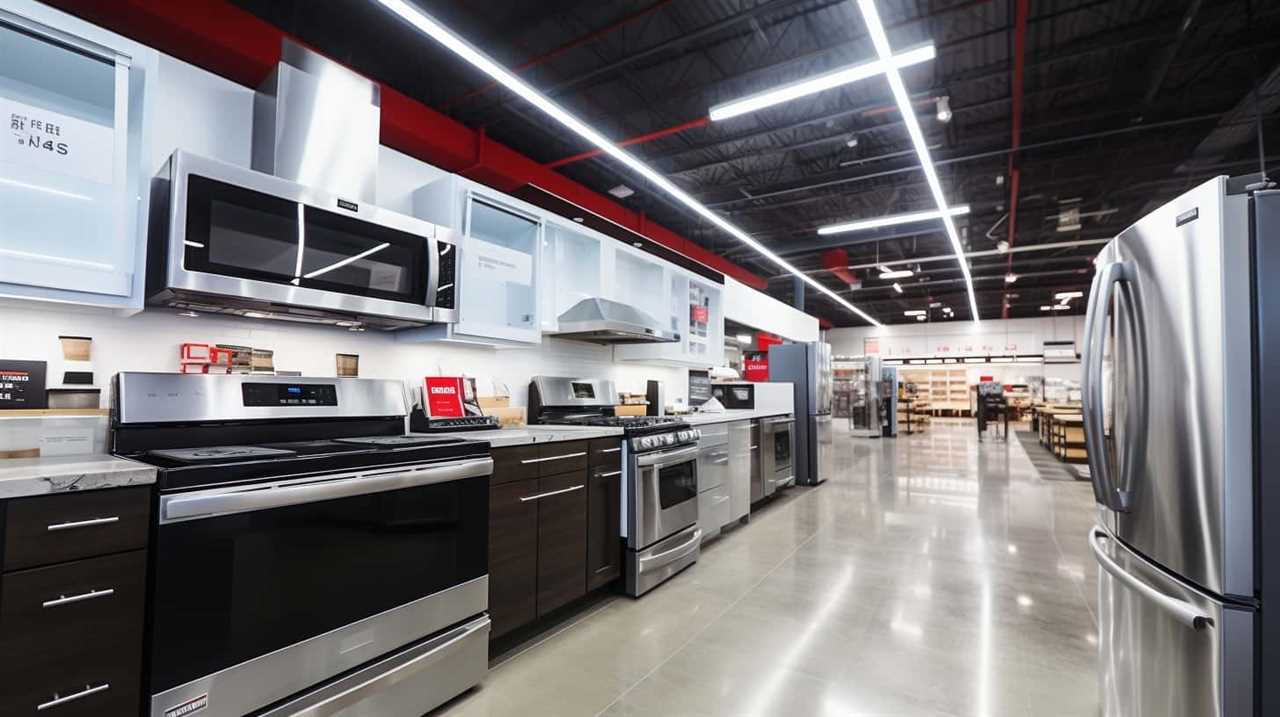
Automated Herb Garden
Continuing from the previous subtopic, let’s explore another essential kitchen gadget that every home chef needs: an automated herb garden.
With advancements in technology, smart herb gardens have become a game-changer for those who want to elevate their cooking skills. Here are some benefits of having an automated herb garden in your kitchen:
- Convenience: Imagine having fresh herbs at your fingertips, without the hassle of going to the store or dealing with wilted herbs. An automated herb garden allows you to grow a variety of herbs right in your kitchen, ensuring their freshness whenever you need them.
- Space-saving: If you have limited space in your kitchen, an automated herb garden is a perfect solution. These compact devices can fit on your countertop or even hang on the wall, providing you with a convenient and space-saving way to grow your favorite herbs.
- Efficiency: Smart herb gardens use automated indoor gardening techniques to optimize the growth of your herbs. With built-in sensors and timers, they ensure the right amount of light, water, and nutrients for your plants, resulting in healthier and more abundant harvests.
- Sustainability: By growing your own herbs, you reduce your reliance on store-bought produce, which often comes wrapped in plastic and travels long distances. An automated herb garden allows you to embrace a more sustainable lifestyle by cultivating fresh, organic herbs right at home.
Incorporating a smart herb garden into your kitchen not only enhances the flavors of your dishes but also brings a sense of pride and accomplishment as you master the art of growing your own ingredients. With these automated indoor gardening techniques, you can enjoy the benefits of fresh herbs all year round, elevating your culinary creations to new heights.
Frequently Asked Questions
How Much Energy Does a Smart Refrigerator Consume Compared to a Traditional Refrigerator?
Smart refrigerators consume significantly less energy compared to traditional refrigerators. This energy consumption comparison is one of the many benefits of owning a smart refrigerator.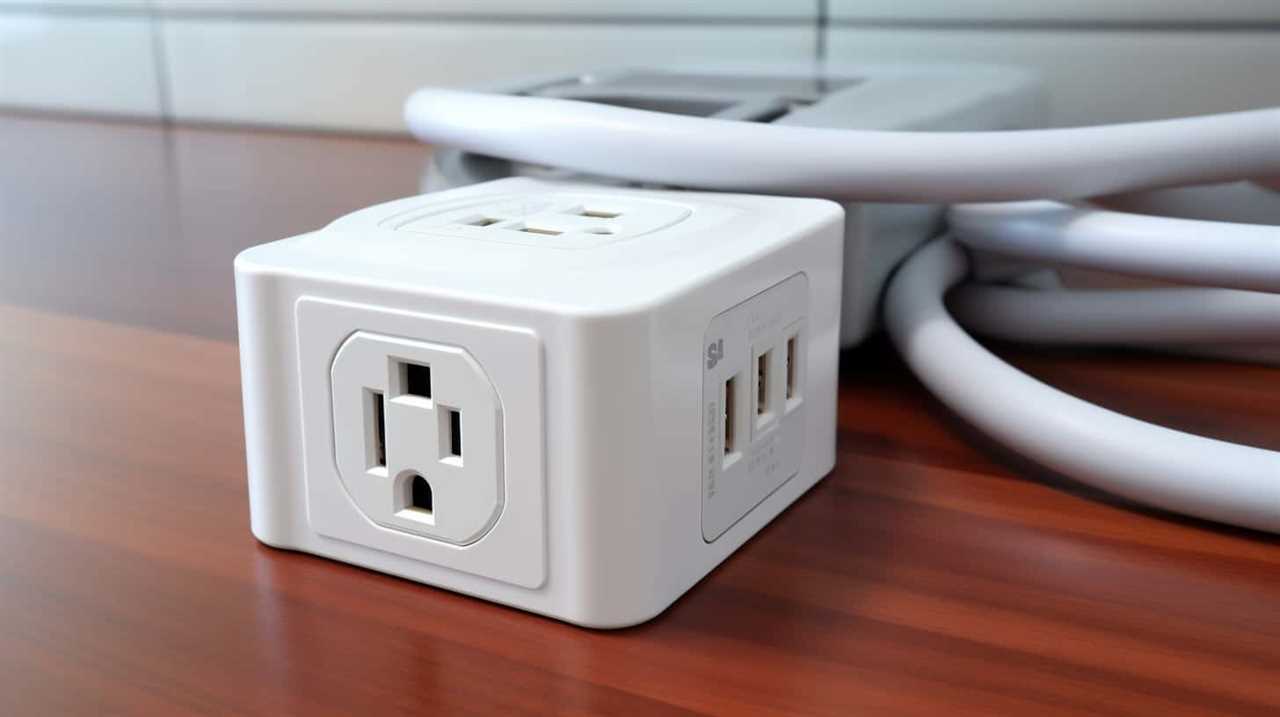
With advanced features like energy-saving modes, temperature control, and smart sensors, these gadgets optimize energy usage to keep your food fresh while minimizing electricity consumption.
Can a Voice-Activated Assistant Be Paired With Other Smart Kitchen Gadgets Like the Smart Coffee Maker or the Automated Herb Garden?
Yes, a voice-activated assistant can be paired with other smart kitchen gadgets like the smart coffee maker or the automated herb garden. This integration offers convenience and efficiency in the kitchen. With a simple voice command, you can brew your coffee or tend to your herbs without lifting a finger.
However, there are some drawbacks to using voice activated assistants in the kitchen, such as potential misinterpretation of commands or limited compatibility with certain gadgets.
What Is the Cooking Capacity of a Smart Slow Cooker?
The cooking capacity of a smart slow cooker is essential to know for any home chef. It allows us to plan and prepare meals efficiently.

With programmable settings, we can set the cooking time and temperature according to our recipe, ensuring perfectly cooked dishes every time. This feature is especially helpful for busy individuals who want to come home to a delicious meal without spending hours in the kitchen.
Can the Bluetooth Food Scale Be Connected to a Smartphone App for Tracking Nutritional Information?
Yes, the Bluetooth food scale can indeed be connected to a smartphone app for tracking nutritional information. This innovative feature allows us to easily monitor our food intake and make informed choices about our diet.
Additionally, by integrating the scale with a smart refrigerator, we can optimize our meal planning and reduce food waste. Not only does this save us time and money, but it also promotes sustainability by minimizing energy consumption.
It’s truly a game-changer for any home chef seeking mastery in the kitchen.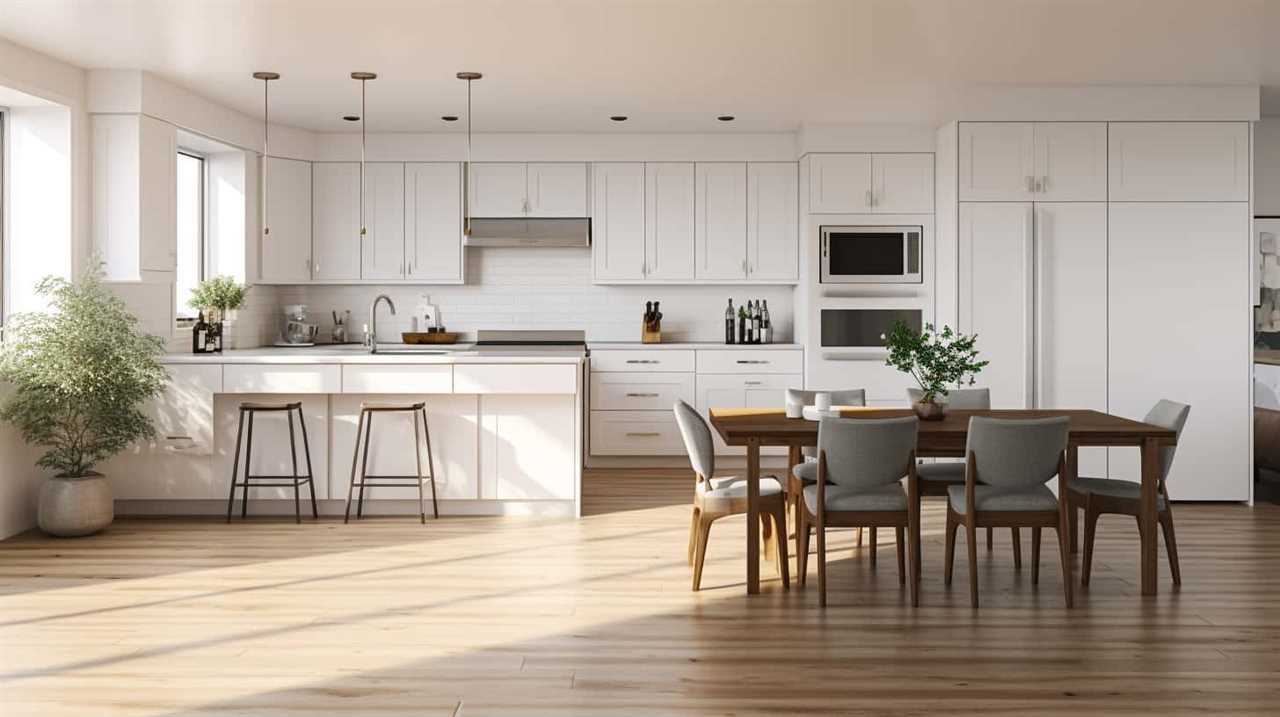
Are There Any Safety Features in Place for the Automated Pot Stirrer to Prevent Accidents or Spills?
When it comes to the automated pot stirrer, safety is a top priority. This innovative gadget is designed with built-in safety features to prevent accidents and spills. With its advanced technology, it ensures that the pot is securely attached and stable, minimizing the risk of any mishaps.
Additionally, the automated pot stirrer is equipped with sensors that can detect any irregularities or potential hazards, instantly alerting the user and taking necessary precautions. So you can confidently cook without worrying about any safety concerns.
Are Any of the Smart Kitchen Gadgets Environmentally Friendly?
Many smart home eco devices, including smart kitchen gadgets, are designed with sustainability in mind. These gadgets use energy-efficient technology and eco-friendly materials to reduce their environmental impact. From smart thermostats to composting appliances, there are plenty of options for creating an environmentally friendly kitchen.
Conclusion
In conclusion, these 11 smart kitchen gadgets are a game-changer for any home chef. With the convenience of a smart refrigerator, the efficiency of a Wi-Fi enabled oven, and the help of a voice-activated assistant, cooking has never been easier.
Don’t forget the smart coffee maker for that perfect cup of joe and the automatic pot stirrer to save you time and effort. So why wait? Embrace the future of cooking and upgrade your kitchen with these technologically-savvy gadgets.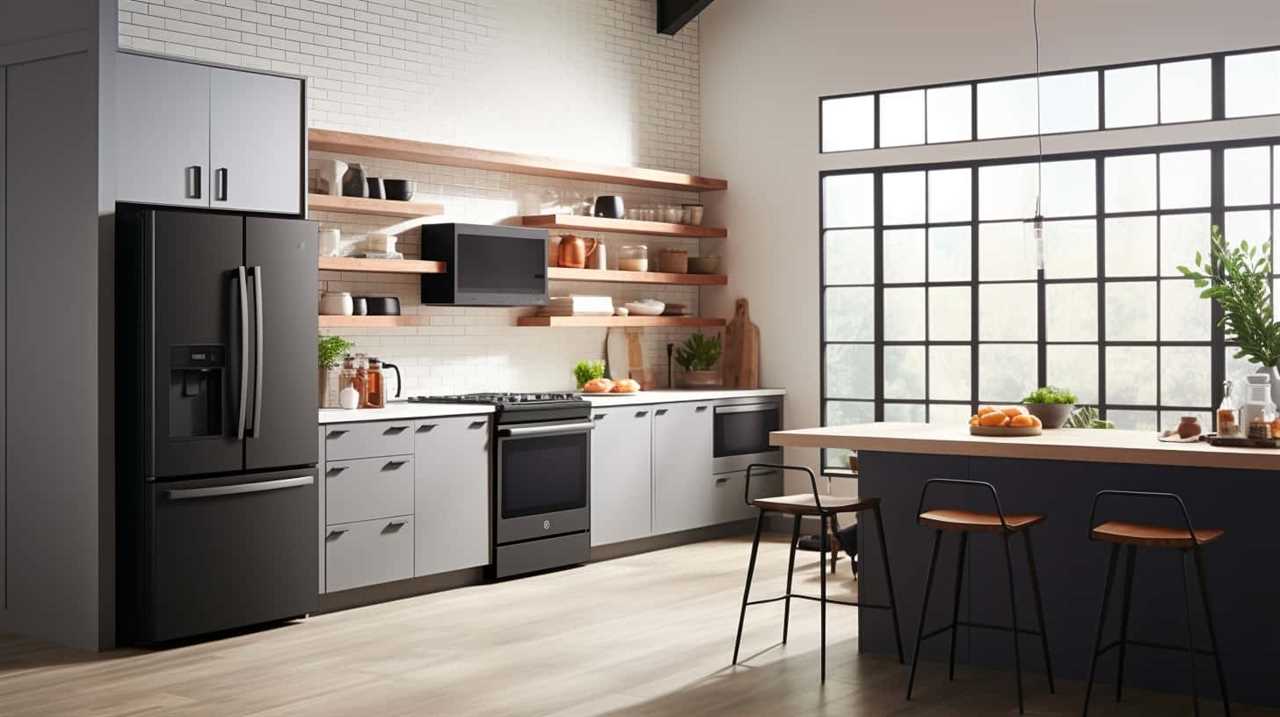
Remember, ‘The kitchen is the heart of the home.’
- About the Author
- Latest Posts
Introducing Charles, the Editor in Chief at ByRetreat, whose passion for interior design and editorial excellence elevates every remote workspace to new heights. With his keen eye for detail, impeccable taste, and expertise in design, Charles brings a wealth of knowledge and creativity to the ByRetreat team.
As the Editor in Chief of a renowned lifestyle blog, Charles has honed his skills in curating captivating content and staying up-to-date with the latest trends in interior design. His deep understanding of aesthetics and the power of storytelling through design enables him to create remote workspaces that are not only visually stunning but also rich in personality and meaning.
Garage Door Opener
Finding the Ideal Garage Door Opener Outlet Location
Get ready to discover the crucial factors determining the perfect placement for your garage door opener outlet.

When determining the best spot for a garage door opener socket, think of it as finding the missing piece to make your garage convenient and functional.
The placement of this outlet can significantly impact the ease of use and safety of your garage door opener system. So, where should it be positioned for optimal performance?
Let's explore the key factors that come into play to ensure a seamless experience with your garage door opener.
Key Takeaways
- Place the outlet around 9 feet above the door for optimal accessibility and functionality.
- Position the outlet slightly off-center to avoid interference with future insulation and maintenance.
- Ensure safety by locating the receptacle 3 feet back and 10 feet from the outside wall.
- Consult with professionals to guarantee proper placement and enhance usability.
Importance of Outlet Placement
Why is the placement of the outlet for your garage door opener crucial for optimal functionality and safety?
When it comes to the garage door opener, the electrical outlet placement plays a significant role in ensuring smooth operation and safety. By strategically locating the outlet around 9 feet above the door, slightly off-center, accessibility is enhanced without impeding future insulation or drywall modifications. This positioning also minimizes the risk of interference with the garage door opener's mechanisms, promoting seamless functionality.
Moreover, considering factors like ease of access, safety, and compliance with electrical regulations is essential for a secure and efficient garage door opener setup. Therefore, choosing the right spot for the outlet is paramount to guaranteeing the proper functioning and safety of your garage door opener.
It's not just about convenience; it's about ensuring that your garage door opener operates optimally while meeting essential safety standards and regulatory requirements.
Factors Affecting Outlet Location

Considering the layout and structure of your garage, several key factors influence the optimal placement of the outlet for your garage door opener. The door height plays a crucial role, with the ideal outlet location typically around 9 feet above the door for convenient access.
It's essential to position the outlet slightly to the side to avoid interference with future insulation and drywall work. Communicating with builders before installation can ensure the proper placement and prevent common mistakes that might arise.
Be cautious not to place the receptacle too far from the door as this could lead to issues with the opener cord reaching comfortably. Ensuring that the outlet location allows for smooth operation and easy maintenance is crucial for long-term convenience.
Safety Considerations for Outlet Placement
For optimal safety and convenience in outlet placement for your garage door opener, it's essential to position the receptacle 3 feet back from the end of the open garage door and approximately 10 feet from the outside wall. Placing the outlet in this specific location helps prevent any potential hazards that could arise from the door mechanisms or the opener's cord. By ensuring the receptacle is behind the opener, you maintain a clear pathway when the door is fully open, decreasing the risk of tripping or entanglement.
To further enhance safety, it's crucial to confirm that the cord length of the opener, typically between 3 to 4 feet, comfortably reaches the receptacle without any stretching or strain. If needed, use lumber to frame out a lower place to secure the cord of the opener to the receptacle adequately. Additionally, prioritize installing a Ground Fault Circuit Interrupter (GFCI) protected receptacle to add an extra layer of safety measures to your garage.
Convenience and Accessibility of Outlets

To ensure optimal convenience and accessibility for your garage door opener outlet, positioning it approximately 9 feet above the door allows for easy access during operation. This placement ensures that the outlet is within reach of the opener cord, reducing the risk of any operational issues. Additionally, consider situating the outlet slightly off-center to accommodate future insulation and drywall work, providing flexibility for any renovations.
When communicating with builders about the placement of the garage door opener outlet, make sure to convey the importance of having it positioned at the right height and distance from the door. Common mistakes, such as placing the receptacle too far from the door, can hinder optimal accessibility and convenience. By discussing the outlet location with builders beforehand, you can ensure that it is installed in a way that meets your needs and maximizes usability.
To illustrate further, here is a table outlining the key considerations for positioning your garage door opener outlet:
| Consideration | Description |
|---|---|
| Height Above Door | Approximately 9 feet for easy access during operation. |
| Distance from Opener Cord | Within reach to prevent operational issues. |
| Off-Center Placement | Slightly off-center to accommodate future insulation and drywall work. |
| Communication with Builders | Discuss with builders to determine the best outlet placement before installation. |
| Avoiding Common Mistakes | Ensure the receptacle is not placed too far from the door for optimal accessibility. |
Tips for Optimal Garage Door Opener Outlet Location
When determining the ideal location for your garage door opener outlet, prioritize accessibility and functionality by placing it at a height of around 9 feet above the door. This placement ensures easy reach and connection to the opener cord, facilitating seamless operation.
To optimize your garage door opener outlet location, consider the following tips:
- Positioning: Place the outlet slightly to the side to avoid interference with future insulation and drywall work.
- Consultation: Communicate with builders or professionals before installation to ensure proper placement and avoid common mistakes.
- Reachability: Avoid placing the receptacle too far from the door to prevent issues with the opener cord reaching the power source.
- Functionality: Ensure the outlet location allows for easy access and connection to maintain a smooth and efficient operation of your garage door opener.
Frequently Asked Questions
Where Should a Garage Door Opener Outlet Be Placed?
We recommend placing a garage door opener outlet near the ceiling, around 9 feet above the door for easy access. Positioning it slightly to the side can prevent interference and future issues with insulation or drywall.
Opt for a location a few feet above the door height and off-center for practical accessibility. Avoid surface mounting and ensure it's within reach of the opener cord.
Consult professionals for proper placement to avoid common mistakes.
Where Should Outlets Be Placed in a Garage?
When outfitting a garage with outlets, strategic placement is key. Consider functionality and convenience. Ensure outlets are accessible and comply with safety standards to avoid interference with garage door openers.
Optimal positioning is crucial for smooth operation. By placing outlets thoughtfully, we guarantee efficiency and ease of access. Properly spaced outlets contribute to a well-organized, functional workspace.
Take care in positioning outlets for a seamless garage experience.
Can the Garage Door Opener Be on Same Circuit as Garage Receptacles?
Yes, the garage door opener can be on the same circuit as the garage receptacles. This setup is convenient for installation and operation, simplifying wiring and electrical planning.
It's a common practice in residential settings to share the circuit between the garage door opener and receptacles. However, it's crucial to consult with an electrician to ensure the circuit can handle the combined load of both devices effectively.
How Do I Program My Garage Door Opener Outlet?
We've programmed many garage door opener outlets! Locate the 'Learn' button on the unit. Press and release it, then quickly hit the remote's button to program it.
Wait for the light to flash, showing successful programming. Test the remote for proper operation.
Always follow the manufacturer's instructions for specific steps. It's as easy as that to program your garage door opener outlet.
Conclusion
In conclusion, finding the ideal location for your garage door opener outlet is like finding the perfect key for a locked door – it unlocks convenience and safety.
By considering factors such as placement, safety measures, and accessibility, you can ensure smooth operation and peace of mind.
Remember, consulting with a professional and following best practices can guarantee a seamless experience every time you open your garage door.
- About the Author
- Latest Posts
Introducing Ron, the home decor aficionado at ByRetreat, whose passion for creating beautiful and inviting spaces is at the heart of his work. With his deep knowledge of home decor and his innate sense of style, Ron brings a wealth of expertise and a keen eye for detail to the ByRetreat team.
Ron’s love for home decor goes beyond aesthetics; he understands that our surroundings play a significant role in our overall well-being and productivity. With this in mind, Ron is dedicated to transforming remote workspaces into havens of comfort, functionality, and beauty.
-

 Decor1 week ago
Decor1 week agoMaximalist Decor Explained: Embrace More Style
-

 Vetted2 weeks ago
Vetted2 weeks ago15 Best Foot Massagers for Neuropathy to Soothe Your Feet and Relieve Discomfort
-
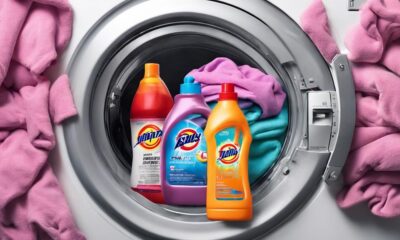
 Vetted3 weeks ago
Vetted3 weeks ago15 Best Sports Laundry Detergents for Keeping Your Activewear Fresh and Clean
-
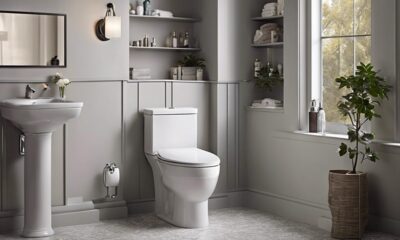
 Vetted3 weeks ago
Vetted3 weeks ago15 Best Tall Toilets for Seniors That Combine Comfort and Safety
-

 Vetted4 weeks ago
Vetted4 weeks ago15 Best Dish Scrubbers to Keep Your Kitchen Sparkling Clean
-
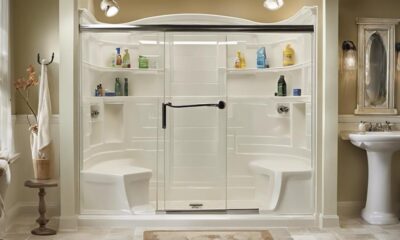
 Vetted2 days ago
Vetted2 days ago15 Best Cleaners for Fiberglass Showers to Keep Your Bathroom Sparkling Clean
-

 Decor4 weeks ago
Decor4 weeks agoWhat Is Eclectic Home Decor
-

 Vetted7 days ago
Vetted7 days ago15 Best Organic Pest Control Solutions for a Naturally Pest-Free Home





